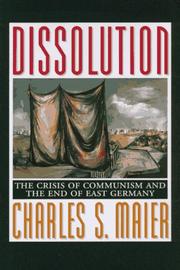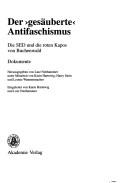| Listing 1 - 5 of 5 |
Sort by
|
Book
ISBN: 1306792460 3486707361 3486792199 3486590324 9781306792462 9783486707366 Year: 2009 Publisher: De Gruyter
Abstract | Keywords | Export | Availability | Bookmark
 Loading...
Loading...Choose an application
- Reference Manager
- EndNote
- RefWorks (Direct export to RefWorks)
Otto Grotewohl kommt in der Geschichte der deutschen Arbeiterbewegung eine Schlüsselposition zu. Der Sozialdemokrat wirkte nach dem Zweiten Weltkrieg maßgeblich an der Zwangsvereinigung von SPD und KPD mit, obwohl er ein solches Projekt anfangs abgelehnt hatte. Außerdem segnete er die innerparteiliche Verfolgung ehemaliger Sozialdemokraten sowie die Transformation der SED in eine kommunistische Kaderpartei ab. Grotewohls Wandlung vom Kritiker zum Befürworter der Zwangsvereinigung, die zur Beseitigung der SPD in der SBZ/DDR führte, und zum linientreuen Parteisoldaten lässt sich jedoch nur dann verstehen, wenn sein Aufstieg in der Weimarer Republik, seine Erfahrungen in der NS-Zeit sowie sein politisches Handeln nach 1945 eingehend analysiert werden. In Dierk Hoffmanns Biographie werden Zwangslagen und Handlungsspielräume des Politikers, der in der zweiten deutschen Diktatur zum Ministerpräsidenten aufstieg, sein persönliches Versagen und seine politische Verstrickung lebendig.
Statesmen --- Grotewohl, Otto, --- Sozialistische Einheitspartei Deutschlands. --- Germany (East) --- Politics and government. --- Public officers --- Grotevolʹ, Otto, --- Socialist Unity Party of Germany --- SED --- Sot︠s︡ialisticheskai︠a︡ edinai︠a︡ partii︠a︡ Germanii --- Német Szocialista Egységpárt --- GESP --- Germanska edinna sot︠s︡ialisticheska partii︠a︡ --- SEPG --- Niemiecka Socjalistyczna Partia Jedności --- Kommunistische Partei Deutschlands --- Sozialdemokratische Partei Deutschlands --- Partei des Demokratischen Sozialismus (Germany)
Book
ISBN: 3804603270 9783804603271 Year: 1987 Publisher: Köln Wissenschaft und Politik
Abstract | Keywords | Export | Availability | Bookmark
 Loading...
Loading...Choose an application
- Reference Manager
- EndNote
- RefWorks (Direct export to RefWorks)
Sozialistische Einheitspartei Deutschlands --- -Socialist Unity Party of Germany --- SED --- Sot︠s︡ialisticheskai︠a︡ edinai︠a︡ partii︠a︡ Germanii --- Német Szocialista Egységpárt --- GESP --- Germanska edinna sot︠s︡ialisticheska partii︠a︡ --- SEPG --- Niemiecka Socjalistyczna Partia Jedności --- Kommunistische Partei Deutschlands --- Sozialdemokratische Partei Deutschlands --- Partei des Demokratischen Sozialismus (Germany) --- History --- Germany (East) --- -Politics and government --- Kommunistische Partei --- Kommunismus --- Communistische Partij --- Communisme --- Politisches System --- Oost-Duitsland --- Sozialistische Einheitspartei Deutschlands (DDR) --- Sozialistische Einheitspartei Deutschlands. --- -History --- Oost-Duitsland. --- Sozialistische Einheitspartei Deutschlands (DDR). --- History. --- Politics and government.
Book
ISBN: 3804687083 Year: 1988 Publisher: Köln Verlag Wissenschaft und Politik
Abstract | Keywords | Export | Availability | Bookmark
 Loading...
Loading...Choose an application
- Reference Manager
- EndNote
- RefWorks (Direct export to RefWorks)
German reunification question (1949-1990) --- 301.175 --- 329 --- Duitsland (DDR) --- German question (1949-1990) --- German unification question (1949-1990) --- Reunification of Germany question (1949-1990) --- Unification of Germany question (1949-1990) --- Sociale verandering --- Politieke partijen --- Sozialistische Einheitspartei Deutschlands --- -Socialist Unity Party of Germany --- SED --- Sot︠s︡ialisticheskai︠a︡ edinai︠a︡ partii︠a︡ Germanii --- Német Szocialista Egységpárt --- GESP --- Germanska edinna sot︠s︡ialisticheska partii︠a︡ --- SEPG --- Niemiecka Socjalistyczna Partia Jedności --- Kommunistische Partei Deutschlands --- Sozialdemokratische Partei Deutschlands --- Partei des Demokratischen Sozialismus (Germany) --- Platforms --- -Platforms --- Platforms.

ISBN: 0691078793 0691007462 1400822254 9786612457807 1282457802 1400812585 1400812585 140080504X Year: 1999 Publisher: Princeton, N.J. Princeton University Press
Abstract | Keywords | Export | Availability | Bookmark
 Loading...
Loading...Choose an application
- Reference Manager
- EndNote
- RefWorks (Direct export to RefWorks)
Against the backdrop of one of the great transformations of our century, the sudden and unexpected fall of communism as a ruling system, Charles Maier recounts the history and demise of East Germany. Dissolution is his poignant, analytically provocative account of the decline and fall of the late German Democratic Republic. This book explains the powerful causes for the disintegration of German communism as it constructs the complex history of the GDR. Maier looks at the turning points in East Germany's forty-year history and at the mix of coercion and consent by which the regime functioned. He analyzes the GDR as it evolved from the purges of the 1950s to the peace movements and emerging youth culture of the 1980s, and then turns his attention to charges of Stasi collaboration that surfaced after 1989. In the context of describing the larger collapse of communism, Maier analyzes German elements that had counterparts throughout the Soviet bloc, including its systemic and eventually terminal economic crisis, corruption and privilege in the SED, the influence of the Stasi and the plight of intellectuals and writers, and the slow loss of confidence on the part of the ruling elite. He then discusses the mass protests and proliferation of dissident groups in 1989, the collapse of the ruling party, and the troubled aftermath of unification. Dissolution is the first book that spans the communist collapse and the ensuing process of unification, and that draws on newly available archival documents from the last phases of the GDR, including Stasi reports, transcripts of Politburo and Central Committee debates, and papers from the Economic Planning Commission, the Council of Ministers, and the office files of key party officials. This book is further bolstered by Maier's extensive knowledge of European history and the Cold War, his personal observations and conversations with East Germans during the country's dramatic transition, and memoirs and other eyewitness accounts published during the four-decade history of the GDR.
History of Germany and Austria --- anno 1980-1989 --- anno 1990-1999 --- Opposition (Political science) --- Opposition (Science politique) --- Sozialistische Einheitspartei Deutschlands --- -Opposition (Political science) --- Socialist Unity Party of Germany --- SED --- Sot︠s︡ialisticheskai︠a︡ edinai︠a︡ partii︠a︡ Germanii --- Német Szocialista Egységpárt --- GESP --- Germanska edinna sot︠s︡ialisticheska partii︠a︡ --- SEPG --- Niemiecka Socjalistyczna Partia Jedności --- Kommunistische Partei Deutschlands --- Sozialdemokratische Partei Deutschlands --- Partei des Demokratischen Sozialismus (Germany) --- -Sozialistische Einheitspartei Deutschlands --- Communism --- Sozialistische Einheitspartei Deutschlands. --- Germany (East) --- Germany --- Politics and government --- History --- Communisme --- Allemagne (Est) --- Allemagne --- Politique et gouvernement --- Histoire

ISBN: 3050026472 3050070498 Year: 1994 Publisher: Berlin Akademie Verlag
Abstract | Keywords | Export | Availability | Bookmark
 Loading...
Loading...Choose an application
- Reference Manager
- EndNote
- RefWorks (Direct export to RefWorks)
History of Germany and Austria --- anno 1940-1949 --- anno 1950-1959 --- Communists --- -Political prisoners --- -World War, 1939-1945 --- -European War, 1939-1945 --- Second World War, 1939-1945 --- World War 2, 1939-1945 --- World War II, 1939-1945 --- World War Two, 1939-1945 --- WW II (World War, 1939-1945) --- WWII (World War, 1939-1945) --- History, Modern --- Prisoners of conscience --- Prisoners --- Communism --- History --- -History --- -Prisoners and prisons, German --- Kommunistische Partei Deutschlands --- -Sozialistische Einheitspartei Deutschlands --- -Buchenwald (Concentration camp) --- Concentration Camp Buchenwald --- CC Buchenwald --- KL Buchenwald --- Konzentrationslager Buchenwald --- KZ Buchenwald --- Sowjetisches Speziallager Nr. 2 --- Socialist Unity Party of Germany --- SED --- Sot︠s︡ialisticheskai︠a︡ edinai︠a︡ partii︠a︡ Germanii --- Német Szocialista Egységpárt --- GESP --- Germanska edinna sot︠s︡ialisticheska partii︠a︡ --- SEPG --- Niemiecka Socjalistyczna Partia Jedności --- Sozialdemokratische Partei Deutschlands --- Partei des Demokratischen Sozialismus (Germany) --- Communist Party of Germany --- KPD --- K.P.D. --- Kommunisticheskai︠a︡ Partii︠a︡ Germanii --- Komunistyczna Partia Niemiec --- German Communist Party --- Vereinigte Kommunistische Partei Deutschlands --- Doitsu Kyōsantō --- Parti communiste d'Allemagne --- P.C.A. --- PCA --- Partido Comunista de Alemania --- Spartakusbund (Germany) --- Sozialistische Einheitspartei Deutschlands --- Political prisoners --- World War, 1939-1945 --- Prisoners and prisons, German --- Buchenwald (Concentration camp) --- History. --- Buchenwald (Germany: Concentration camp) --- Prisoners and prisons [German ] --- Germany --- 20th century --- Persons
| Listing 1 - 5 of 5 |
Sort by
|

 Search
Search Feedback
Feedback About UniCat
About UniCat  Help
Help News
News